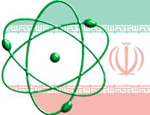 AFP: Iran said Tuesday its nuclear and foreign policies will not change after President Mahmoud Ahmadinejad abruptly fired Foreign Minister Manouchehr Mottaki and replaced him with the atomic chief.
AFP: Iran said Tuesday its nuclear and foreign policies will not change after President Mahmoud Ahmadinejad abruptly fired Foreign Minister Manouchehr Mottaki and replaced him with the atomic chief.
By Hiedeh Farmani
 TEHRAN (AFP) — Iran said Tuesday its nuclear and foreign policies will not change after President Mahmoud Ahmadinejad abruptly fired Foreign Minister Manouchehr Mottaki and replaced him with the atomic chief.
TEHRAN (AFP) — Iran said Tuesday its nuclear and foreign policies will not change after President Mahmoud Ahmadinejad abruptly fired Foreign Minister Manouchehr Mottaki and replaced him with the atomic chief.
“Iran’s major international policies are defined in higher levels and the foreign ministry executes these policies. We will not see any changes in our basic policies,” foreign ministry spokesman Ramin Mehmanparast said at his weekly briefing.
“I don’t think there will be any changes in the nuclear policy and the talks” with world powers over Iran’s nuclear programme, he said.
Ahmadinejad on Monday named Ali Akbar Salehi, a vice-president and head of Iran’s atomic energy organisation, as interim foreign minister after sacking Mottaki.
No reasons were given for the surprise move, but several Iranian newspapers on Tuesday linked it to disagreements between Ahmadinejad and Mottaki over foreign policy.
The sacking came just days after Iran held crunch talks in Geneva on December 6 and 7 with world powers over its controversial nuclear dossier.
Further talks are scheduled for next month in Iran’s neighbour Turkey despite clear differences at the end of Geneva meeting between Iran and the group of P5+1 — Britain, China, France, Germany, Russia and the United States.
EU foreign policy chief Catherine Ashton, who represented the major powers, said it had been agreed at the Geneva talks to hold further talks to “discuss practical ideas and ways of cooperating towards the resolution of our core concerns about the nuclear issue.”
However, Iran’s nuclear chief negotiator Saeed Jalili said both sides agreed only to further “talks based on cooperation.”
Mehmanparast repeated on Tuesday that “it has been agreed that talks be pursued for cooperation in common points.”
“If the atmosphere of talks is free of pressure and irrational behaviour, talks have their own framework and will follow their own course,” he added.
Salehi, 61, who was appointed atomic energy chief on July 17, 2009, has been a driving force behind Iran’s atomic programme, and during his tenure the country’s first nuclear power plant has come on line.
Mottaki’s sudden dismissal made it to the front pages of most Iranian newspapers on Tuesday.
Several conservative papers linked the sacking to a dispute between Mottaki and Ahmadinejad over “parallel diplomacy,” which flared up in summer after the president named his close aides as special envoys in the region.
Ahmadinejad backed down only after Iran’s supreme leader Ayatollah Ali Khamenei intervened.
“The president put an end to disagreement with the foreign minister,” conservative newspaper Qods said, adding that Ahmadinejad’s decision on envoys had drawn Mottaki’s “harsh reaction.”
“Earthquake in foreign ministry” was the headline of Khabar newspaper, which is close to Ahmadinejad’s rival, parliament speaker Ali Larijani.
“Ahmadinejad knows well that Salehi appeals to the West for his moderate views,” the paper said, predicting that the atomic chief will be “one of the managers to form a new circle in the government although he is not ideologically linked with the president.”
Salehi is a PhD graduate of the prestigious MIT in the United States and served as Tehran’s representative in the Vienna-based International Atomic Energy Agency during the presidency of the reformist Mohammad Khatami.
Mottaki, 57, a career diplomat who was appointed foreign minister in August 2005, was sacked while he was in Senegal on an official visit.
Earlier this month, at a security meeting in neighbouring Bahrain, Mottaki hailed as a “step forward” remarks by US Secretary of State Hillary Clinton that Iran is entitled to a peaceful nuclear energy programme but only once it has demonstrated it can carry it out in a responsible manner.
His comments appeared to cut across the Islamic republic’s official position, repeated almost daily, that its enrichment of uranium is non-negotiable.


